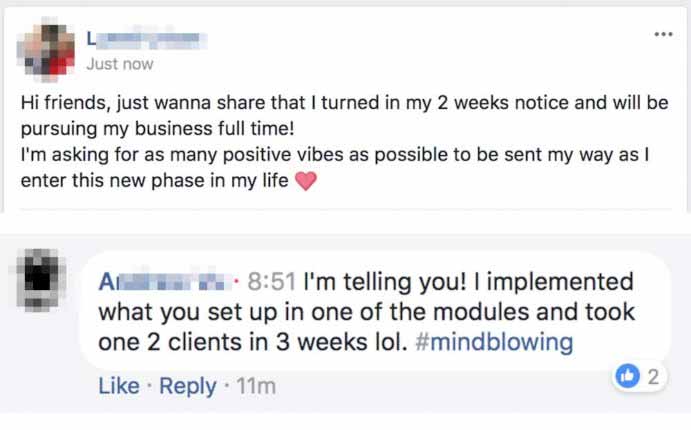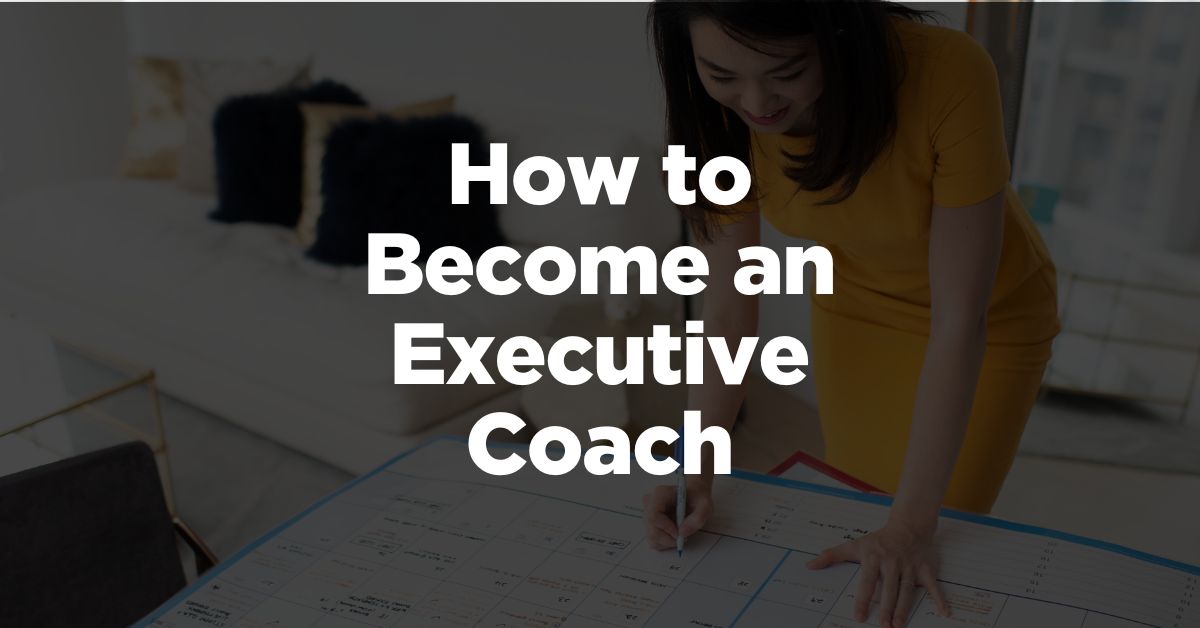Want to know how to become an executive coach?
You’re in the right place. Today, you’ll learn how to start an executive coaching business that’s massively abundant and profitable—not just financially, but also personally.
Want to learn more? Read on!
How do you become an executive coach?
How do you start an executive coaching business?
What is executive coaching?
Executive coaching is coaching provided to senior managers, executives, and SEOs of an organization. You as the coach offer support and help your students become better leaders by understanding their strengths and weaknesses, clarifying their goals, and taking steps to reach their goals.
But what exactly are the benefits of starting an executive coaching business? That’s what we’ll look at next.
Get the Ultimate Guide
for building a
6-Figure Coaching Business so you can achieve more freedom!
What are the benefits of becoming an executive coach?
Why should you become an executive coach? An executive, or leadership, coaching business is an excellent business model for those who want more freedom and flexibility, AKA a Freedom Business that is all about supporting your life and not the other way around. A coaching business can help you replace your salary (and more) and be in charge of your own time.
Even more importantly, executive coaching is fulfilling. As an executive coach, you make a big difference in people’s lives.
You see, 61% of coaching clients say that coaching has helped them improve their business management skills. Another study shows that executive coaching can have a 788% ROI thanks to improvements in areas such as productivity and employee satisfaction. The average ROI of executive coaching can be almost 6x the cost of coaching. Leadership coaching can also help female leaders improve in areas such as performance, well-being, self-awareness, leadership, and relationships.
Ultimately, 75% of coaching students say that the value of coaching is considerably or far greater than the money and time they’ve invested.
A famous example of an executive coach is Bill Campbell, who coached CEOs from Apple’s Steve Jobs to Facebook’s Sheryl Sandberg. For instance, Eric Schmidt, the former CEO of Google, says that Campbell helped them grow past the trillion-dollar mark and that: “all of our interviews indicated that everyone agrees they would not have been nearly as successful without that coaching.”
Businesses need executive coaching, too. For example, employee retention and overall sales increase due to higher employee engagement–a few coaching benefits executive coaches can help organisations achieve.
In other words, executive coaches can make a big impact. But what does it really mean to be an executive coach? Let’s find out.
What does an executive coach do?
What does a leadership coach do? As an executive coach, you help your clients improve their communication skills, work relationships, confidence, decision-making abilities, and overcome challenges. You might also act as a sounding board for ideas and offer accountability.
You can either offer one-on-one coaching or group coaching (but if you’re new to coaching, start with private coaching). Down the line, you can offer online courses to scale your business.
Your coaching can be online or face-to-face. Online coaching is getting increasingly popular and offers the most flexibility. Plus, you reach a far bigger number of people than if you offer your services locally.
Are executive coaches in demand?
Yes, executive coaches are in demand.
For instance, 1.5 million online searches are made every month by people and companies who want to find executive coaches, life coaches, and business coaches. Coaching is also a billion-dollar industry. In 2019, the estimated revenue from coaching was $2.849 billion.
70% of organizations say that they offer some type of leadership coaching. Over 40% of them say that they increase their spending on leadership coaching. Coaching is increasingly seen as an important tool to achieve leadership success and improve the bottom line.
But can YOU become an executive coach? That’s what we’ll look at next.
Who can become a leadership coach?
Executive coaching requires a solid background as a leader who has been where your clients are now. If you don’t have that background (yet), you can start as a career coach and work your way to executive coaching.
Career coaching means that you coach employees on goal setting, skill development, and other professional skills. But the difference is that career coaches don’t focus on leadership and so you don’t need the same background as an executive. If you want to learn more about career coaching, read my guide on how to become a career coach here.
What’s more, the requirements for you as an executive coach are likely higher than for other types of coaching. Many higher-level organizations might require well-recognized executive coaching certifications, like this one from INSEAD.
On the other hand, that level of expertise also means that you can ask for higher rates. Let’s take a look.
What is the average executive coach salary?
According to the International Coaching Federation, the average annual salary for coaches is $62,500. However, that’s just the average, and you can make more or less compared to this figure.
Plus, executive coaching is a high-end service, so once you’ve established yourself as a coach, you could easily make six figures, multiple six figures, or even seven figures.
Several of my students in various industries like executive and career coaching, health coaching, mindset coaching and more are doing just that.
Results like this are possible for you too.
Jacquelynn, the student here above, is a Life Coach for professionals. Not an industry that immediately comes to mind when you think of selling a $5,000 package. As a new coach, to boot. (AKA no matter what industry you’re in, you can build a great business.)
What’s more, she actually initially struggled to even sell a $1,500 package.
She didn’t give up though. That goes to show that just because you don’t get immediate results or don’t feel confident doesn’t mean you’re not going to get results. (In fact, like for Jacquelynn, your initial results could end up being even better than you’d hoped for.)
Jacquelynn continued following my proven steps to building her business, created a quick intensive offer, and…here we are.
And here’s another student who figured out what it took to get to multiple six figures in sales:
“I’m two days out from the end of the month, and just crossed $45K+ in sales, $22K+ new cash collected.
That’s the most sales I’ve ever had in any single month of my business…ever.
[Surpassing] the $20K-per-month milestone I’d been working on for a while on my own. I’d sticky-taped lots of bits of a business together, but…it was really having an end-to-end system in place that made a huge difference, and allowed me to grow with less stress and more confidence.
I think the biggest thing is just watching the system work. It’s literally like I used to visualize months ago, just seeing those payments coming in at all times of day….which is incredible.
Can’t thank you enough. Before, the “dream” still felt out of reach. Now it feels real in a way it never did before. You weren’t wrong when you said a lot can change in a few months. ”
As you can see, creating a Freedom Business that makes great money is totally possible.
But how do leadership coaches actually make money? The first way is by selling one-on-one coaching offers. So you coach someone privately to help them achieve their goals. You can then add on group coaching.
And if you want to scale from your business past six figures and more, you can add on online courses and/or hire coaches who help you coach your students. In other words, the possibilities are endless.
If you’re curious to learn more about what it takes to grow a wildly profitable business, take a look at this short video where I share the top rules for building a 6-figure coaching business:
But how do you become an executive coach? That’s what we’ll look at next.
How do you become an executive coach?
How do you become a leadership coach? Here’s what you need to start a leadership coaching business, how long it takes to become an executive coach, and what the best executive coaching certifications are.
How do you start as an executive coach?
To get started as an executive coach, you pretty much just need a laptop. Other than that, you can get an executive coaching certificate. However, a certificate isn’t something you’re required to have in most coaching niches.
That said, you might need to show that you’ve taken courses and certifications from credible institutions, especially if you work with bigger organizations.
You also need an offer. You can’t just say “I sell executive coaching” because that’s not enticing enough. (Why should someone choose YOU as their coach among all the other executive coaches out there?)
Instead, what’s the transformation you offer? That’s your offer. Maybe you help ambitious women achieve leadership positions or managers become better leaders.
Either way, we’ll look more at your offer below. But first, will it take you years to start your business? Not so fast, here’s what you need to know!
How long does it take to become an executive coach?
You can start your executive coaching business right away (assuming you have the right experience). However, if you want to get certified, certification processes usually take at least a few months.
That’s why a hybrid approach is a great solution. Start selling your coaching services right now, develop your coaching skills, and educate yourself further while you build your business.
But how long does it take to get your first few clients?
Getting your first paying client can happen fast or take a few months. It all depends on how fast you figure out your offer and how fast you start selling it. Some of my students start selling their offers right away and some want to take it slower.

What are the best executive coaching courses and executive coach certifications?
As an executive coach, you don’t necessarily need a coaching certification. There are niches where coaching certifications are needed, but those are typically in health-related niches. Plus, some clients might require you to have a certification.
But ultimately, your success as a coach is based on the results you help your clients get. If you build a great reputation thanks to all the results your clients achieve after working with you, certifications and courses don’t matter that much.
However, here are some of the top institutions in the world that offer executive coaching training:
- INSEAD
- University of California, Berkeley
- Georgetown University
- Columbia Business School
- Brown University
- Northwestern University
- University of Toronto
- Harvard University
- MIT
- Johns Hopkins University
- University of Pennsylvania
- Stanford University
Getting certified or taking a course on the side from a credible institution isn’t a bad idea… The organizations you work with might see this as a big plus.
And that leads us to the next question. How do you start a leadership coaching business? Let’s find out.
Get the Ultimate Guide
for building a
6-Figure Coaching Business so you can achieve more freedom!
How do you start an executive coaching business?
How do you start building your business? Here’s what you need to know about starting your coaching business from scratch.
How much should executive coaching cost?
Executive coaching can cost anywhere from $2,000 to $10,000 and more. It all depends on who you’re coaching. For instance, if you coach managers, you wouldn’t charge as much as if you’re coaching a CEO of a multi-billion dollar business.
Obviously, the experience you need for coaching high-level CEOs versus managers is very different. And you might work your way up from first coaching lower-level executives and ultimately, working with CEOs.
Either way, I always recommend my students to start with a three-month $1,500 package unless they already have coaching experience. Once you have a few clients and testimonials, you can increase your rates.
When you start at a relatively low rate, you give yourself space to improve your coaching skills (this applies to you if you haven’t coached before). Your clients get a good deal and so it’s a win-win situation.
How do you set up your executive coaching services?
Your executive coaching services are fairly easy to set up. You first need a coaching agreement and, eventually, a coaching business structure.
While you don’t need to set up a business before you have paying clients, you also shouldn’t overthink your business structure.
Lisa Fraley, a legal coach, helps coaches set up their businesses in the right way. Her first package helps you set up a coaching contract template and the second one is a business starting pack with all the essentials for your business.
Apart from a coaching agreement, you also need a coaching package. If you’re taking on your first clients, start with a three-month package. This timeframe is long enough for them to get results and short enough so that it’s easy to say yes.
And remember to make your coaching package results-focused. That’s what people truly care about, rather than any features you might offer (the number of coaching calls, supplementary material, and so on).
To create a results-focused coaching program, think about the ultimate goal you help your students get. That’s the goal you should build your coaching program around.
Plus, figure out WHO you want to sell to. Be very specific and exclusively focus on one ideal client, at least until you’ve passed multiple six figures, if not more, in annual revenue.
When you get this piece right, you no longer have to spend time explaining the “value” of your price, or convincing your ideal clients why it’s smart to invest in themselves via your offer.
If you want to learn more about how to quickly set up your business, take a look at this short video:
How do you coach people to achieve results, though? Let’s take a look.
How do you become a great executive coach?
As a coach, you can choose between two coaching styles.
The first school of thought is “Socratic questioning” where the coachee finds the answers themselves. You as a coach support them by asking them questions.
The other school of thought and a more modern form of coaching is to “coach-sult”, AKA a combination of coaching and consulting. This is the type of coaching where you both let your student find the answers themselves and help them find the answer by drawing from your own experience.
So, you’d both support your students in developing their leadership skills and help them by offering your own expertise.
Though the most important thing is to help them get results.
And a great way to do so is to break down the ultimate goal of your coaching program into monthly sub-goals. For instance, if you help executives improve their leadership style (with defined goals in terms of what good leadership means for your student), you could organize your program like this:
Month 1 – Communication
The first month is all about helping your client improve their communication style. Maybe you have them do different exercises, journal, and in other ways work on their communication skills.
Month 2 – Goal setting
In this fictional example, your client might have defined goal setting as an important leadership trait for them. Here, you might have them nail down their goal-setting skills, be it with the help of OKRs or other goal-setting methodologies.
Month 3 – Employee satisfaction
As the last sub-goal, you might work specifically on improving employee satisfaction and bringing your program together. See how this is much more results-based than if you don’t organize your program into these goals?
In this short video, you learn even more about becoming a great coach:
Now you know how to set up an executive coaching program. But how do you get your first clients? Let’s find out.
How do you get your first paying clients as an executive coach?
To start your business, you need your first paying clients. But how do you get them?
There are a few ways in which you can market your coaching services. Here they are:
#1: Your network
First, your network. Your network is an excellent place to start when you’re first marketing your services.
For instance, I sold my first coaching packages thanks to my network. I reached out to people I knew who had previously asked me for advice on the things I wanted to coach on and got my first few clients.
What’s more, people in your network might know other people who need your services and refer them to you.
#2: LinkedIn
The second strategy is LinkedIn. As a professional social media platform, LinkedIn is perfect for your services. By publishing posts and connecting with other users, you build connections on the platform.
For instance, that’s how my student Emily Liou grew her career coaching business.

Obviously, you need to be mindful of how you use LinkedIn to make this strategy work.
When I first started my business, I used Facebook groups to connect with potential customers.
I went in with the mindset, “how can I offer as much value as possible?” rather than “how can I sell as much as possible?”
I offered my expertise for free, helped people by answering their questions, and wrote posts that people could relate to and found entertaining. As a result, I built relationships and soon more and more people started signing up for my sales calls.
#3: Podcasts and guest posts
The final strategy is to get interviewed on podcasts and guest posts. These are some of the most effective strategies out there because you get in front of an engaged audience. I’ve used both of these strategies to get clients; in fact, people still buy my products years after I’ve published a guest post or been on a podcast.
Those are the three top ways to get your first coaching clients. By using these strategies consistently, you’ll quickly start selling your first coaching packages.
And if you want to know how to get those dream clients who love working with you, watch this short video I put together:
But how do you ultimately scale your coaching business? Here’s what you need to know.
How do you scale your leadership coaching business?
Finally, how do you take your executive coaching business from a steady six figures to multiple six figures and more?
You need to scale your leadership coaching business. There are a few ways in which you can grow your business:
Group programs
First, we have group programs. When you run a group program, you coach a group of people rather than one person at a time. You reach more people and can scale your coaching.
This type of coaching program is beneficial for coachees, too; they learn from other group coaching students and get access to you for a lower rate than your one-on-one program.
Online courses
You can also use online courses to scale. Online courses are essentially your coaching offers in an e-learning format. Courses offer the most flexibility because you create them once and don’t have to actively put in more of your time.
However, you should have coached at least a few people before you start selling courses. That way, you can simply take your coaching methodology and turn it into a course.
Team of coaches
Last, you can train and hire coaches who coach your students so that you don’t have to put in your personal time. You continue selling your programs but your hired coaches take care of the actual coaching.
The alternative you use to scale depends on your goals and the type of business you want to build. Typically, my students start with one-on-one coaching, then move on to group coaching, and ultimately, create an online course.
Get the Ultimate Guide
for building a
6-Figure Coaching Business so you can achieve more freedom!
Over to you!
There you have it! Now you know how to become an executive coach.
What it comes down to is that you take consistent steps to find your first paying clients.
Now, I’d love to hear from you:
What’s the #1 reason you want to become a leadership coach?
Let me know in the comments below!








